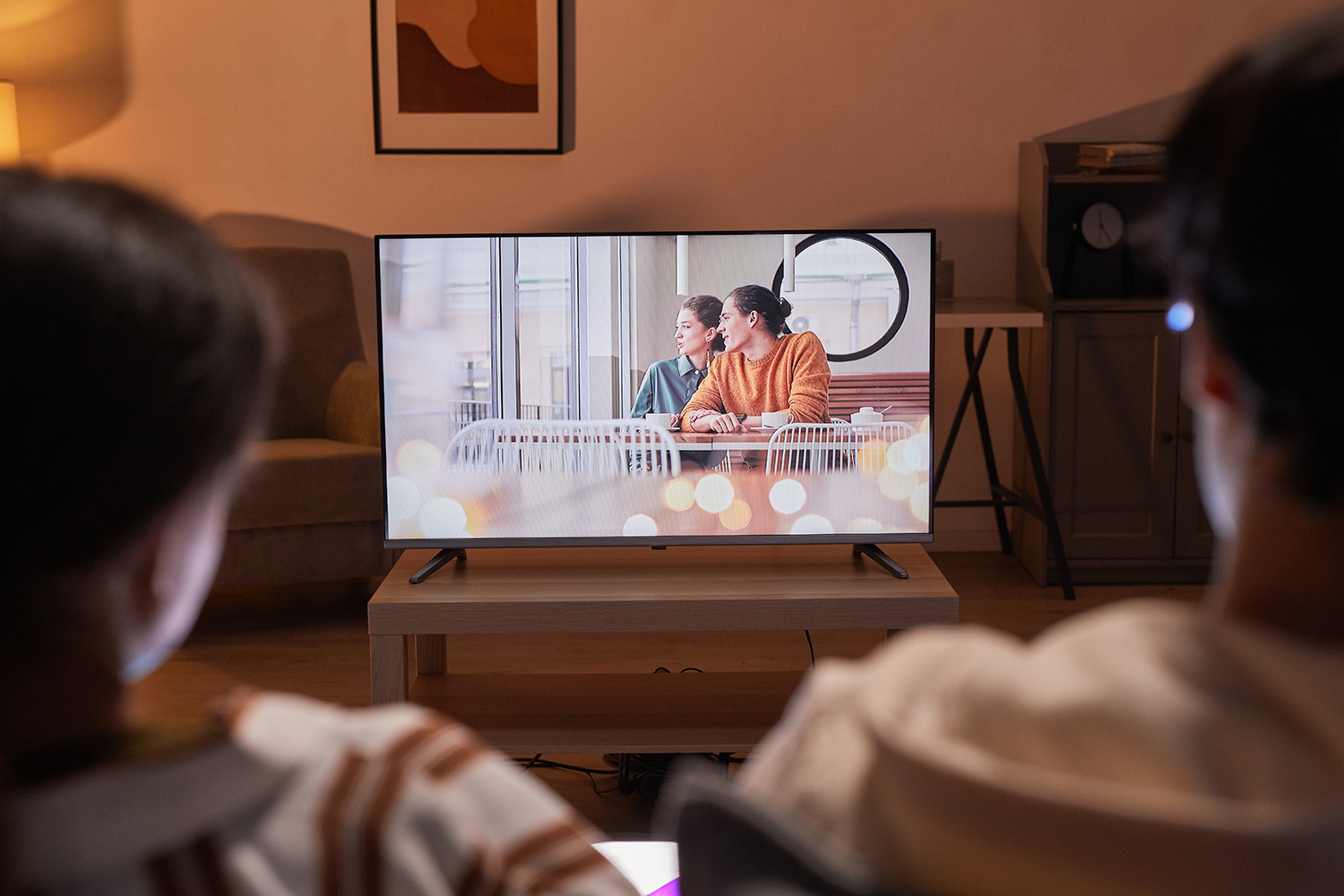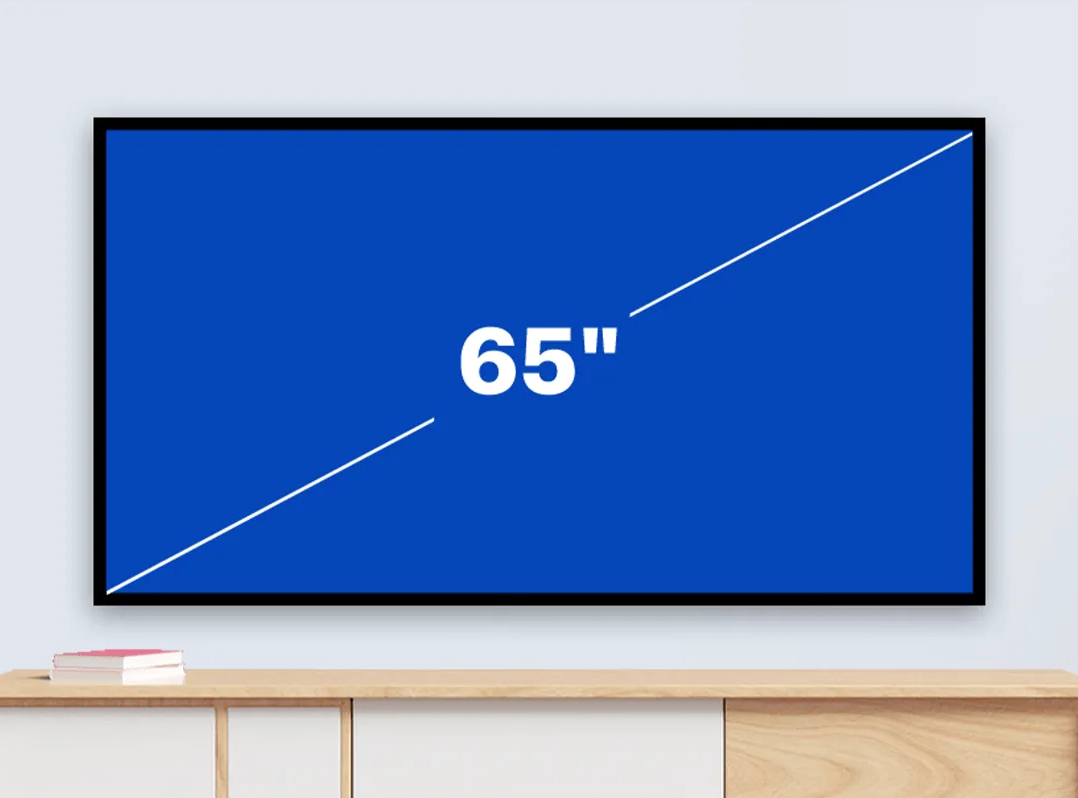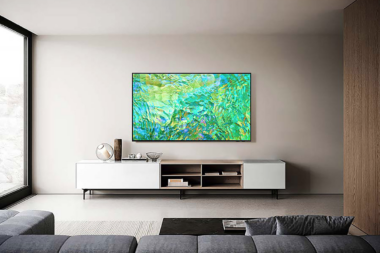
Have you been searching to find the perfect TV for your home and you’ve been hesitating between a 55-inch TV and a 65-inch TV? Choosing the right TV size can really impact your viewing experience, and it can also affect your comfort level while watching and even affect the entire aesthetic of your room. 55-inch and 65-inch TVs are both the most popular TV sizes, and they each have their pros and cons. If you’d like to find the ideal screen for your home, here’s a look at how to understand TV screen sizes and how to choose the right TV for your living room or home theatre.
Understanding TV sizes
TV sizes are measured diagonally from corner to corner, so a 55-inch TV and a 65-inch TV will have screen diagonals of 55 inches (139.7 cm) and 65 inches (165.1 cm) respectively. However, this measurement doesn’t include the bezel (the frame around the screen), so the actual space your TV occupies could be larger than you may think.

Need help choosing the right TV for your home? Check out our TV buying guide.
How to choose the right TV size for your space
Choosing the right TV for a home isn’t just about the measurements of the TV itself. To find the right fit for your space it’s important to consider the TV vs. room ratio, meaning the relation of the TV to the size of your room and how much space you have available. For example, you wouldn’t want to put an 85-inch TV in a small room that’s only 100 square feet because the entire room would feel like it was taken up by the TV.
Room size and ideal viewing distance
Setting up your perfect living room starts with understanding the ideal viewing distance for your TV, and viewing distance is important when deciding between a 55-inch and a 65-inch TV. For a 55-inch TV, the sweet spot for viewing lies around 2 metres away from your seating area. That distance creates a cozy, intimate atmosphere perfect for smaller spaces. If you’re moving up to a 65-inch TV, the optimal viewing distance extends to about 2.5 metres, giving you more of a home theatre feeling.
Why does viewing distance matter? It strikes a balance between immersion and comfort. The right distance ensures you’re close enough to be enveloped by the visual experience but far enough to avoid eye strain and any distortion you would feel if you were sitting too close to a large screen. This balance is essential for enjoying your TV’s full clarity and detail, especially with high-resolution content like 4K movies or 4K gaming.
TV size and resolution
Both 55-inch and 65-inch TVs typically offer different resolutions including 4K or 8K. However, the way this resolution translates into picture quality varies between different screen sizes. In a 55-inch TV, the same number of pixels is packed into a smaller area, giving you a higher pixel density. This density combined with the smaller size means that even at closer viewing distances, the individual pixels are less discernible. The end result is a smooth and clear picture.
In a 65-inch TV, the pixels are spread over a larger area. While this doesn’t necessarily decrease the sharpness, it does change your viewing experience. The larger screen offers a more immersive feel, so your TV will be great for movies, sports, and games in a larger viewing space. The catch is that as the screen size increases, you’ll need to sit a bit further back to appreciate the full clarity of the image. Sitting further from the TV will also help you avoid pixelation, especially with lower-resolution TVs.
Use cases and viewing experience
How you intend to use the TV is also a factor to consider when choosing the right TV for your needs. 55-inch and 65-inch sizes both offer distinct advantages for different types of content.
Gaming
- 55-inch TV: A 55-inch TV is ideal for most gaming setups. It gives you ample screen space for immersive gameplay without overwhelming a smaller room. The size also ensures that fast-paced action is easy to follow.
- 65-inch TV: A 65-inch TV will offer a more expansive and immersive gaming experience. It’s better suited for larger rooms where the added size brings games to life, so it’s perfect for visually detailed games.
Sports watching

- 55-inch TV: This size TV is great for a typical living room setup as it offers clear visibility of the entire field or court. It’s large enough to enjoy the details of whatever you’re watching without needing to have it set up in a big room.
- 65-inch TV: You can elevate the sports viewing experience with a 65-inch TV, so much so you’ll almost feel like you’re in the stadium. The larger screen is excellent for viewing parties and having your friends over for the big game.
Home theatre experience
- 55-inch TV: A 55-inch display is a good choice for smaller home theatre spaces as it can provide a cinematic experience without dominating the room.
- 65-inch TV: 65 inches is the go-to for a true home cinema experience. Its larger size captures the vibe of a movie theatre, so it’s perfect for film enthusiasts who want a very immersive viewing experience.
Find the right TV for your space at Best Buy
The choice between a 55-inch and a 65-inch TV hinges on balancing your personal viewing preferences, the physical space of your room, and the type of content you like to watch. Whether you opt for the versatility and fit of a 55-inch TV for average-sized rooms or the immersive, cinematic experience of a 65-inch for larger spaces and movie buffs, you’ll find that each size offers a unique set of benefits. The key to choosing between the two is to match the TV to your lifestyle and make sure it enhances your viewing experience and easily integrates into your living room or home theatre.
This article was drafted using AI technology and then reviewed, fact-checked, and revised by a member of our editorial team.





